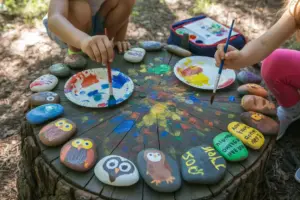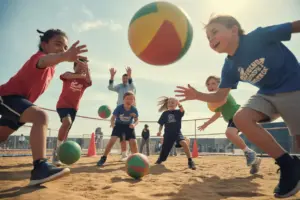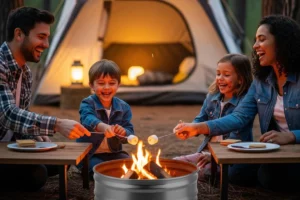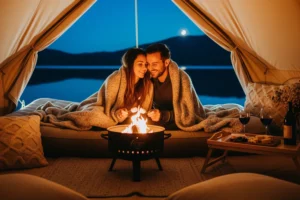Camping with a Baby: A Stress-Free Guide for New Parents
Picture this: gentle morning sunlight filtering through your tent walls, the soft sound of birds chirping, and your baby peacefully sleeping in their portable crib surrounded by nature’s symphony. While many new parents think camping with a baby is impossible, thousands of families discover each year that outdoor adventures can be even more magical with their little ones in tow. Learning how to camp with a baby or newborn doesn’t have to be overwhelming – with proper planning and the right mindset, it can become one of your family’s most treasured experiences.
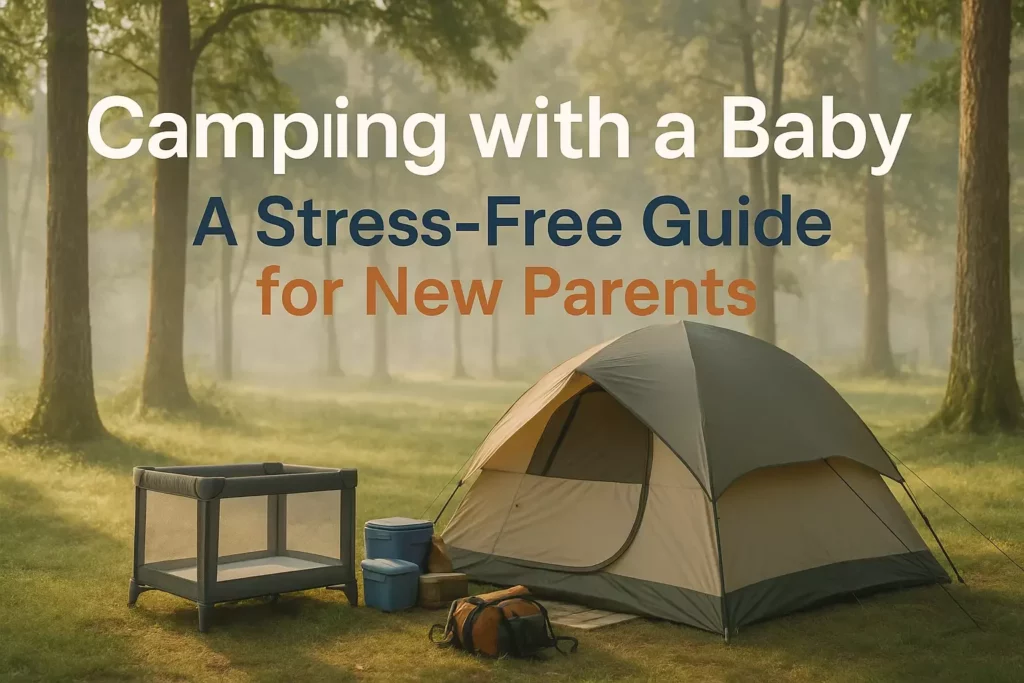
Key Takeaways
- Start with short, nearby trips to test your setup and build confidence before attempting longer camping adventures
- Pack strategically with baby essentials, including extra supplies for feeding, sleeping, and weather protection
- Choose family-friendly campgrounds with amenities like clean restrooms, potable water, and medical facilities nearby
- Maintain flexible expectations and be prepared to adapt your plans based on your baby’s needs and comfort
- Safety comes first – always have emergency contacts, first aid supplies, and an exit strategy ready
Why Camp with Your Baby?
Camping with a baby offers unique benefits that indoor vacations simply can’t match. Fresh air and natural environments can improve sleep patterns for both babies and parents. The change of scenery provides mental health benefits, while the slower pace of camping allows families to bond without the distractions of daily life.
Research shows that early exposure to nature supports healthy development in children. Babies who experience outdoor environments often develop stronger immune systems and better sleep habits. Plus, camping creates lasting memories and establishes a foundation for a lifetime love of the outdoors.
“The best time to plant a tree was 20 years ago. The second best time is now. The same applies to introducing your children to nature – there’s no age too young to start.” – Environmental Education Expert
When to Start: Age Considerations for Camping with a Newborn
Newborns (0-3 months)
Camping with a newborn requires extra caution but isn’t impossible. Pediatricians generally recommend waiting until after the first round of vaccinations (around 2 months) before extended outdoor exposure. Newborns have limited temperature regulation, so mild weather conditions are essential.
Benefits of early camping:
- Babies this age sleep frequently, making them excellent camping companions
- They’re not yet mobile, reducing safety concerns
- Breastfeeding mothers can easily maintain feeding schedules
Infants (3-12 months)
This age range often provides the sweet spot for how to camp with a baby. Infants have better temperature regulation than newborns but aren’t yet crawling or walking into dangerous situations.
Considerations for this age group:
- Introduction of solid foods may require additional meal planning
- Sleep schedules become more established
- Increased awareness of surroundings (both positive and challenging)
Essential Baby Camping Gear Checklist
Shelter and Sleep Systems
Tent Selection:
Choose a tent with adequate space for your family plus baby gear. A family-sized tent setup provides room for a portable crib and easy nighttime access to your baby.
Baby Sleep Solutions:
- Portable travel crib or bassinet
- Familiar bedding from home
- White noise machine (battery-powered)
- Room-darkening tent accessories
Sleep Safety Checklist:
✅ Firm, flat sleep surface
✅ No loose bedding or pillows
✅ Appropriate room temperature
✅ Clear airway access
Feeding Essentials
For Breastfeeding Mothers:
- Comfortable nursing pillow
- Privacy screen or nursing cover
- Extra water for hydration
- Healthy snacks for energy
For Bottle Feeding:
- Sufficient formula for trip duration plus extra
- Clean water source or purification method
- Bottle cleaning supplies
- Insulated storage for prepared bottles
For Babies Eating Solids:
- Pre-packaged baby food or ingredients for homemade meals
- Baby utensils and plates
- High chair or portable feeding seat
- Wet wipes for cleanup
Clothing and Weather Protection
Layer systems work best for babies in outdoor environments. Pack clothing for various weather scenarios, even if forecasts look favorable.
Essential Clothing Items:
- Base layers (onesies and sleepers)
- Insulating layers (fleece or wool)
- Weather protection (rain jacket, sun hat)
- Extra socks and mittens
- Weather-appropriate camping clothes
Choosing the Right Campground
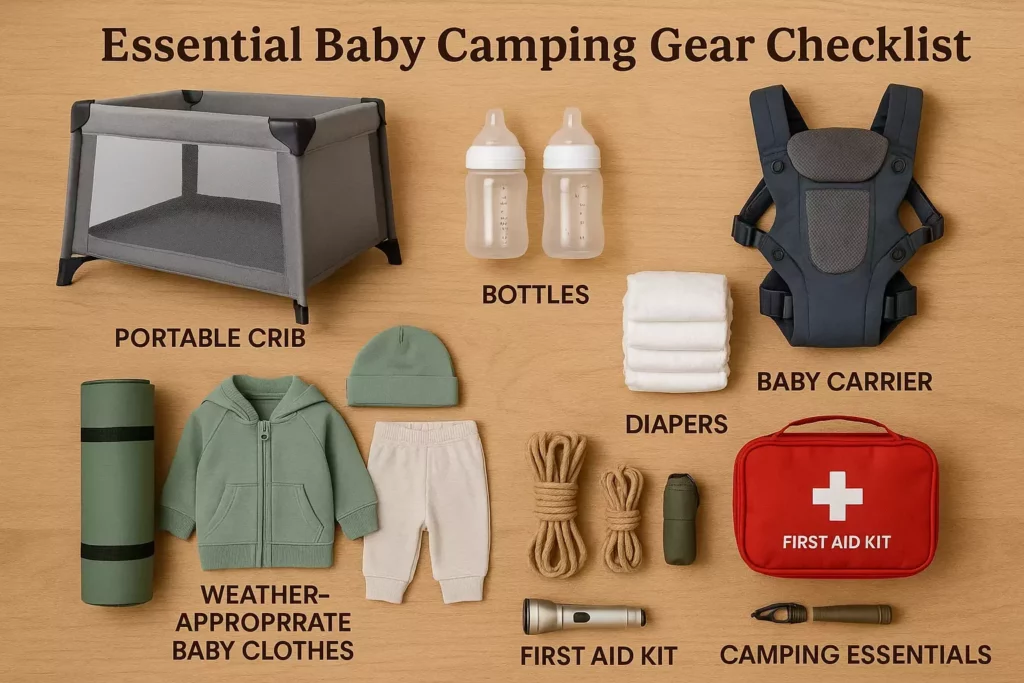
Amenities to Look For
Essential Facilities:
- Clean restrooms with changing tables
- Potable water access
- Nearby medical facilities
- Cell phone coverage
- Paved or well-maintained roads
Helpful Extras:
- Camp stores for forgotten essentials
- Laundry facilities
- Playground areas for older siblings
- Quiet hours enforcement
Location Considerations
Start with campgrounds within 2-3 hours of home for your first baby camping trip. This allows for quick returns if needed and reduces travel stress. State parks often provide excellent family-friendly options with reliable amenities.
Distance Guidelines:
- First trip: Under 2 hours from home
- Experienced families: 4-6 hours maximum
- Consider overnight stops for longer distances
Safety First: Protecting Your Baby Outdoors
Weather Awareness
Babies cannot regulate body temperature as effectively as adults. Monitor weather conditions closely and be prepared to adjust plans.
Temperature Guidelines:
- Ideal range: 65-75°F (18-24°C)
- Avoid camping in extreme heat or cold
- Watch for signs of overheating or hypothermia
Wildlife and Environmental Hazards
Choose campsites away from water hazards and steep drop-offs. Store all food properly to avoid attracting wildlife. Keep a comprehensive first aid kit easily accessible.
Common Hazards to Avoid:
- Poisonous plants (poison ivy, oak, sumac)
- Insect nests or hives
- Unstable terrain
- Open fire pits
- Sharp camping equipment
Emergency Preparedness
Always inform someone of your camping plans and expected return. Carry emergency contact information and know the location of the nearest hospital.
Emergency Kit Essentials:
- Pediatric medications
- Thermometer
- Emergency contact list
- Backup communication device
- Water purification supplies
Feeding Your Baby While Camping
Breastfeeding in the Outdoors
Breastfeeding while camping offers convenience and consistency for babies. Create comfortable nursing spaces using camp chairs and privacy screens. Stay well-hydrated and maintain proper nutrition.
Breastfeeding Tips:
- Nurse frequently to maintain milk supply
- Use lanolin cream to prevent chapping
- Pack extra nursing pads
- Consider a hands-free pumping bra for convenience
Formula Feeding Logistics
Formula feeding requires more planning but remains completely manageable. Ensure access to clean water and proper sterilization methods.
Formula Feeding Steps:
- Use bottled water or properly purified water
- Pre-measure formula powder in containers
- Clean bottles thoroughly after each use
- Store prepared formula at proper temperatures
Introducing Solids Outdoors
For babies eating solid foods, camping can be an adventure in itself. Simple, familiar foods work best. Consider campfire cooking methods for preparing fresh baby meals.
Sleep Solutions and Schedules
Maintaining Sleep Routines
Babies thrive on consistency, so try to maintain familiar sleep routines even while camping. Bring comfort items from home and stick to regular nap and bedtime schedules when possible.
Sleep Routine Elements:
- Consistent bedtime activities
- Familiar sleep environment
- White noise or nature sounds
- Appropriate room temperature
Dealing with Sleep Disruptions
Expect some sleep disruptions during your first camping trips. New sounds, lighting, and environments can affect baby sleep patterns. Be patient and flexible while maintaining safety standards.
Common Sleep Challenges:
- Earlier wake times due to sunlight
- New sounds (wildlife, other campers)
- Temperature fluctuations
- Different sleeping surfaces
Entertainment and Activities
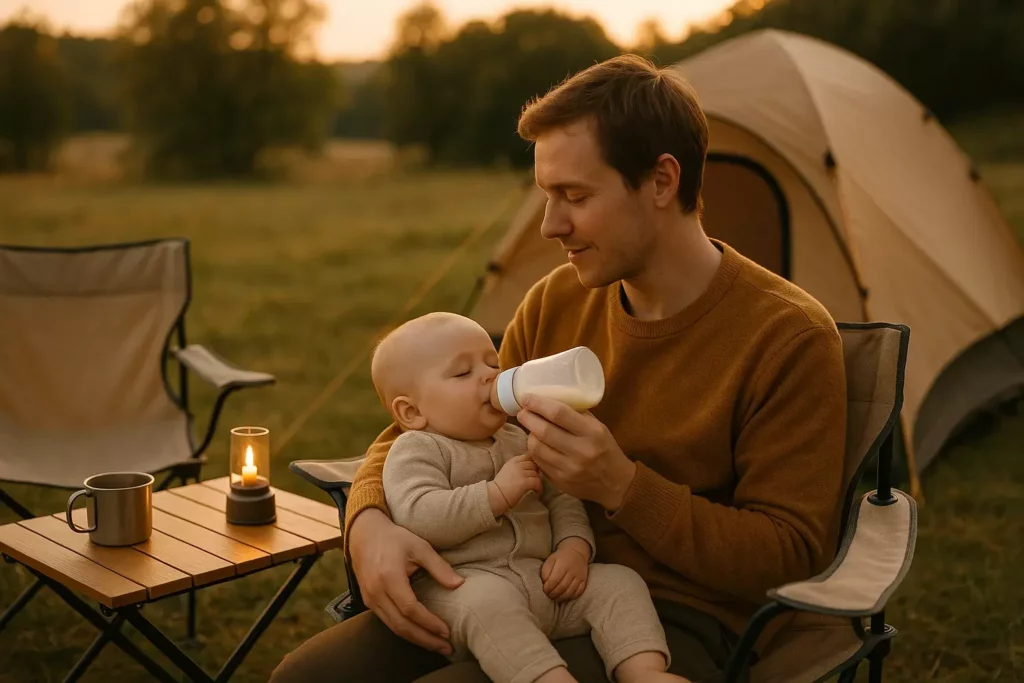
Age-Appropriate Outdoor Activities
Even young babies can enjoy nature through sensory experiences. Create safe spaces for exploration while maintaining constant supervision.
Activities for Babies:
- Tummy time on blankets
- Sensory exploration with natural materials
- Nature walks in strollers or carriers
- Supervised water play
Engaging Older Siblings
If camping with multiple children, plan activities that work for different ages. Older siblings can help with baby care while enjoying age-appropriate outdoor adventures.
Multi-Age Activity Ideas:
- Nature scavenger hunts
- Simple craft projects
- Story time under the stars
- Easy hiking trails with stroller access
Packing Strategies and Organization
Efficient Packing Systems
Organization becomes crucial when packing for camping with a baby. Use clear containers and label everything for easy access during the trip.
Packing Categories:
- Immediate needs: Diapers, wipes, bottles, snacks
- Daily essentials: Clothing changes, feeding supplies
- Emergency items: First aid, medications, extra formula
- Comfort items: Toys, blankets, familiar objects
Weight and Space Considerations
Babies require significant gear, so prioritize essential items and consider weight distribution. Car camping allows for more equipment than backpacking scenarios.
Weight-Saving Tips:
- Choose multi-purpose items
- Limit clothing to essentials plus one extra day
- Use compression sacks for soft items
- Share equipment between family members
🏕️ Personalized Baby Camping Checklist Generator
Get a customized packing list based on your baby’s age and trip details
Common Challenges and Solutions
Weather-Related Issues
Weather changes can significantly impact baby comfort and safety. Monitor forecasts closely and have backup plans ready.
Weather Challenge Solutions:
- Unexpected rain: Waterproof tent setup, covered areas for activities
- Temperature drops: Extra layers, proper sleeping bag selection
- High winds: Secure tent setup, sheltered feeding areas
- Excessive heat: Shade structures, frequent hydration, cooling techniques
Sleep Disruptions
New environments often disrupt baby sleep patterns. Prepare strategies to maintain rest for the whole family.
Sleep Challenge Solutions:
- Maintain familiar bedtime routines
- Use white noise to mask unfamiliar sounds
- Create dark sleeping environments
- Be flexible with nap schedules
Feeding Difficulties
Outdoor feeding can present unique challenges, especially for bottle-fed babies or those eating solid foods.
Feeding Challenge Solutions:
- Pre-prepare bottles when possible
- Bring backup feeding supplies
- Use insulated containers for temperature control
- Have easy cleanup materials readily available
Building Confidence: Progressive Camping Experiences
Start Small
Begin with backyard camping or very short trips to build confidence and test your setup. This allows you to identify missing items or problematic gear without being far from home.
Progressive Trip Planning:
- Backyard camping: Test all gear and routines
- Local campground: 1-2 nights within 30 minutes of home
- Regional camping: 2-3 nights within 2 hours of home
- Extended trips: 4+ nights as comfort and experience grow
Learn from Each Experience
Keep a camping journal noting what worked well and what needs improvement. This information becomes invaluable for planning future trips.
Post-Trip Evaluation Questions:
- What gear was essential vs. unnecessary?
- How did the baby handle different aspects of camping?
- What would make the next trip easier?
- Which activities were most successful?
Advanced Tips for Experienced Baby Campers
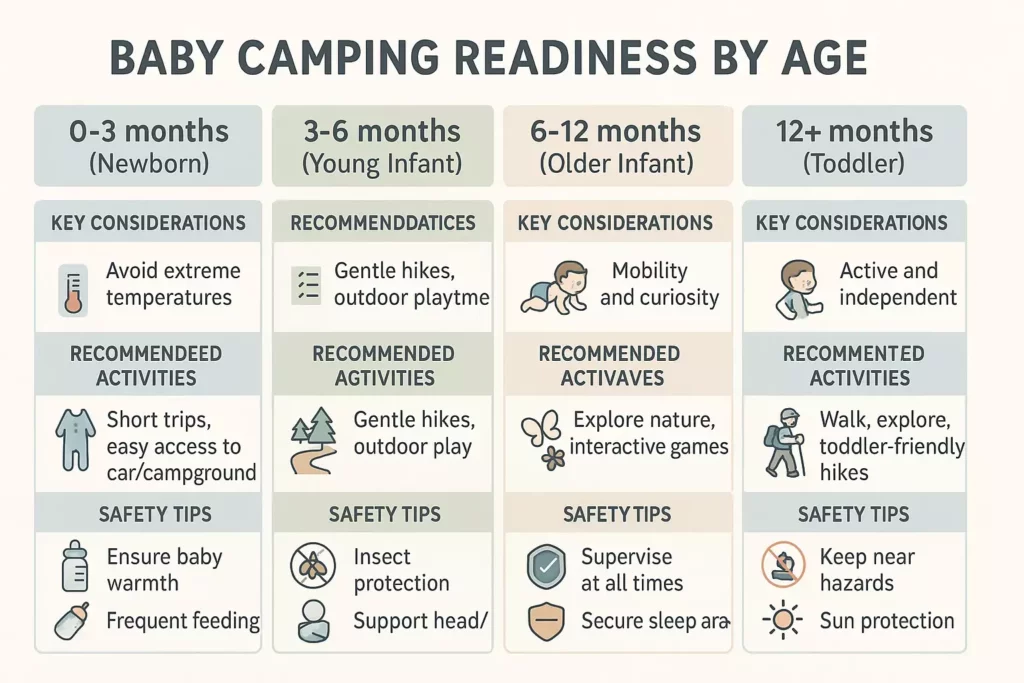
Seasonal Considerations
Each season presents unique opportunities and challenges for camping with babies. Understanding seasonal factors helps with trip planning and gear selection.
Spring Camping:
- Mild temperatures but unpredictable weather
- Increased insect activity
- Beautiful wildflowers and wildlife viewing
Summer Camping:
- Warm temperatures requiring sun protection
- Longer daylight hours affecting sleep schedules
- Peak camping season with crowded campgrounds
Fall Camping:
- Cooler temperatures requiring extra layers
- Beautiful foliage and comfortable hiking weather
- Earlier sunsets supporting normal sleep schedules
Winter Camping:
- Advanced skill level required
- Specialized cold-weather gear essential
- Shorter days and harsh conditions
Multi-Generational Camping
Including grandparents or other family members can enhance the camping experience while providing additional help with baby care.
Benefits of Multi-Generational Trips:
- Extra hands for baby care
- Shared camping knowledge and experience
- Stronger family bonds
- Built-in babysitting for parent breaks
Camping with Multiple Children
Camping with kids of different ages requires additional planning but creates wonderful family memories.
Multi-Child Strategies:
- Assign age-appropriate responsibilities to older children
- Plan activities suitable for various age groups
- Pack entertainment for different developmental stages
- Create buddy systems for safety
Long-Term Benefits of Baby Camping
Developmental Advantages
Regular outdoor exposure supports healthy development in multiple areas:
Physical Development:
- Improved motor skills through varied terrain
- Better balance and coordination
- Enhanced immune system function
- Healthy sleep patterns
Cognitive Development:
- Sensory stimulation from natural environments
- Problem-solving opportunities
- Increased curiosity and exploration
- Better attention spans
Social-Emotional Development:
- Family bonding experiences
- Confidence building through new experiences
- Stress reduction from nature exposure
- Independence and resilience building
Creating Family Traditions
Starting camping traditions when children are babies creates lasting family bonds and shared experiences that continue into adulthood.
Tradition Ideas:
- Annual camping trips to the same location
- Special camping meals or activities
- Nature journals or photo albums
- Camping milestone celebrations
Conclusion
Learning how to camp with a baby or newborn opens up a world of adventure and family bonding opportunities that will create lasting memories. While it requires additional planning and preparation, the rewards of introducing your little one to the great outdoors far outweigh the challenges.
Remember that every family’s camping journey is unique. Start small, stay flexible, and focus on safety above all else. Your first trip might not go perfectly, and that’s completely normal. Each experience builds confidence and skills that make future adventures more enjoyable.
Take action today:
- Research family-friendly campgrounds within 2 hours of your home
- Begin gathering essential baby camping gear using the checklist above
- Plan a backyard camping trial run to test your setup
- Connect with other camping families for tips and encouragement
- Book your first short camping trip for a weekend with favorable weather
The memories you create camping with your baby will become treasured family stories for years to come. Nature provides the perfect backdrop for bonding, learning, and growing together as a family. Start planning your first baby camping adventure today – the great outdoors is waiting to welcome your little explorer! 🏕️👶

